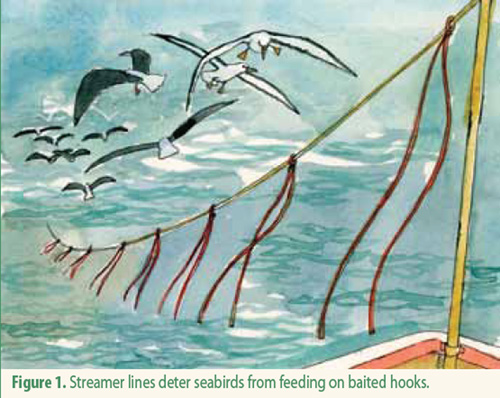Brazil has passed a law determining that longline fishing vessels are to take action to minimize the incidental catch of albatrosses and petrels. The new law came into force in April this year and is to be followed by all vessels operating in waters under Brazilian jurisdiction south of 20°S.
The new law (Instrução Normativa Interministerial (INI) n° 4) determines that fishers must use bird-scaring (tori) lines with suspended coloured streamers and also deploy at least 60-g weights at least 2 m from hooks to increase the sink rate. The new law also requires reporting of the numbers of birds caught. In addition, upon request, longliners are to allow the presence of researchers or observers onboard.
"The highest risk of attacks occurs within 75 m, as this is where the hooks remain on the surface the longest", explained biologist Tatiana Neves, coordinator of Projeto Albatroz. According to Tatiana Neves, the new law is an important tool for the conservation of albatrosses and petrels in Brazil, and reflects the work done in collaboration with the fishing industries and fishers. "Without their support", she said, "it would be impossible to find effective measures to save our seabirds".
Studies undertaken by Projeto Albatroz have shown that without a bird-scaring line, 90 birds are caught for every 100 000 hooks set. If the now legally-required mitigation measures are used, the number drops to 37, a 60% reduction in the mortality rate, as well as a 15% increase in fishing productivity. During 2010, however, no seabirds were reported caught when fishers used the measures.
The use of mitigating measures does not affect fishing productivity. "We have always been concerned about the impact of the measures on the production of the vessels", Tatiana Neves remarks. "This year the experiments of Projeto Albatroz, besides testing new measures, are focused on the study of the impact of the mitigating action on production and stocks".
Projeto Albatroz is sponsored by the Petrobras Environmental Program and works in partnership with the BirdLife Albatross Task Force, the Royal Society for the Protection of the Birds (RSPB) and Save Brasil.
The new law meets international recommendations by the International Commission for the Conservation of Atlantic Tunas (ICCAT), and also follows the guidelines of the Agreement on the Conservation of Albatrosses and Petrels.
The conservation of albatrosses and petrels in Brazilian waters is further provided for by a National Action Plan for Reducing Incidental Catch of Seabirds in Longline Fisheries (NPOA-Seabirds) adopted in June 2006 (click here).
See also http://www.savebrasil.org.br/?q=content/nova-medida-protecao-albatrozes-petreis.
With thanks to Orea Anderson and Projeto Albatroz for information.

John Cooper, ACAP Information Officer, 6 June 2011

 English
English  Français
Français  Español
Español